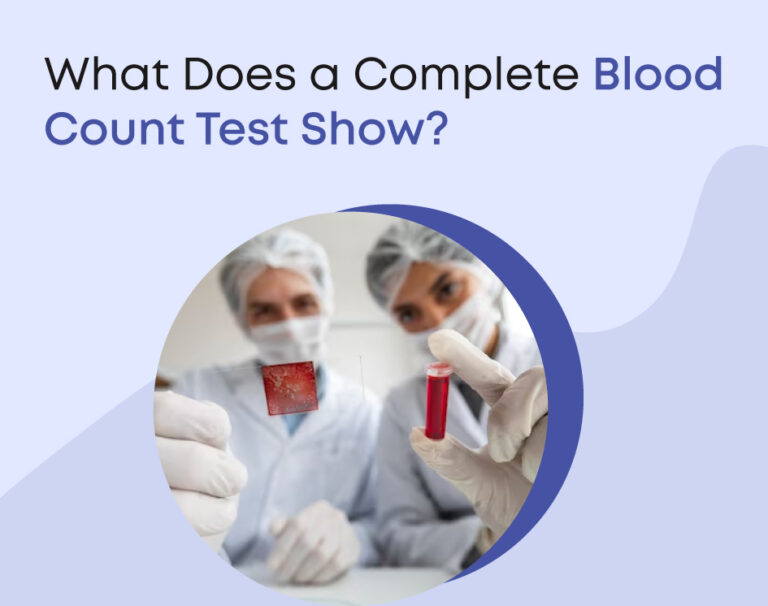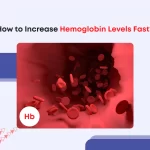
What Does a Complete Blood Count Test Show?
Have you ever wondered what happens when your doctor orders a Complete Blood Count (CBC) or CBP test? It may sound technical, but let’s break it down together.
The complete blood profile (CBP) is like a comprehensive health check for your blood. It’s your doctor’s tool to explore every nook and corner of your bloodstream. This test does not just glance; it dives into the essentials, checking out the red blood cells (RBC), white blood cells (WBC), and platelets.
The CBP test is not just a diagnostic tool; it is your body’s storyteller. It’s like your body telling stories about your body’s various health challenges or treatments.
This blog will explore its exceptional properties and discuss why it is not merely a test but an essential element in maintaining good health.
What is the CBP Test?
The CBP test, or Complete Blood Count, is like a health checkup for your blood. It’s a routine checkup that delves into various components, giving insights into your well-being.
Let’s now clarify the terms used in the CBP test: Hemogram and Blood Count:
Exploring the Hemogram
Think of the Haemogram as your blood’s report card. It covers vital aspects like Hemoglobin, Total RBC Count, and PCV. Haemoglobin carries oxygen throughout your body. The RBCs (red blood cells) are the hard workers. And PCV tells us their proportion in your blood. The RBC Indices include MCV, MCH, MCHC, and RDW-CV. They provide extra details about the size and color of your blood cells.
Knowing your Hemogram is similar to having a health road map. It assists your doctor in detecting potential problems, such as anemia or other blood-related illnesses, early on. This is a preventative measure to maintain you in the best possible health.
Let’s break down these components to understand their significance in assessing your health:
Haemoglobin
Hemoglobin is the oxygen-carrying component in your red blood cells, acting as a crucial player in oxygen transport throughout the body. It binds with oxygen in your lungs and delivers it to every part of your body.
Measuring hemoglobin levels gives information about your blood’s ability to carry oxygen. Low levels indicate anemia or other health issues. Additionally, high levels could signal dehydration or other conditions
Total RBC (Red Blood Cell) Count
The RBC Count is a headcount of all your red blood cells. They are responsible for transporting oxygen.
It provides an overall picture of the oxygen-carrying capacity of your blood. Abnormalities in the count might signal anemia or other blood-related issues.
Packed Cell Volume (PCV)
PCV is a measure of the proportion of red blood cells to the total volume of blood. It shows how densely packed your blood is with red cells.
It helps assess hydration levels and the concentration of red blood cells. Low PCV might indicate anemia or overhydration. Alternatively, high PCV could suggest dehydration or conditions like polycythemia.
RBC (Red Blood Cell) Indices
RBC Indices are additional measurements. They give detailed information about the characteristics of your red blood cells. These indices help understand the size, hemoglobin content, and distribution of red blood cells in your bloodstream. These indices provide additional insights into the characteristics of your red blood cells. Abnormalities in these indices can help identify specific types of anemia or other blood disorders.
Mean Corpuscular Volume (MCV)
MCV is like a measure of the size of your red blood cells. It tells us how much space these cells take up in your blood. It’s a piece of essential information because abnormal MCV levels can signal potential health issues. For instance, a high MCV might indicate a nutrient deficiency. Besides, a low MCV could suggest problems with iron or vitamin B12.
Mean Corpuscular Hemoglobin (MCH)
MCH focuses on the amount of hemoglobin, the oxygen-carrying protein, within your red blood cells. It’s about looking at the concentration of the good stuff inside each cell. Just like MCV, abnormal MCH levels can offer clues about your health. High MCH might suggest a vitamin B12 or folate deficiency. Further, low MCH can indicate conditions such as iron deficiency anemia.
Mean Corpuscular Hemoglobin Concentration (MCHC)
MCHC is a measure of the concentration of hemoglobin in your red blood cells. It’s like determining how densely packed the oxygen carriers are in each cell. Abnormal MCHC levels may be a sign of several medical disorders. High MCHC might be associated with dehydration or a rare blood disorder. Likewise, low MCHC can result in iron deficiency anemia.
Red Cell Distribution Range- Measure of Variation( RDW- CV)
RDW-CV looks at the variation in the size of your red blood cells. In this, doctors check if your cells are all similar in size. Or if there’s a mix of big and small ones. A higher RDW-CV indicates a more significant variation in cell size. This can be a helpful marker for different types of anemia. Sometimes, a higher RDW-CV might be the first sign that something is off. This may need further investigation into your overall health.
Platelet Count
Platelets are like tiny, disc-shaped cells in your blood that play a crucial role in blood clotting. They rush to the site of an injury to stop bleeding. Platelet count measures the number of these clotting cells in your blood. A low platelet count may lead to excessive bleeding, while high counts may indicate potential clotting issues.
Mean Platelet Volume (MPV)
MPV measures the average size of your platelets. It tells us whether your platelets are generally smaller or larger than usual. Abnormal MPV levels can offer insights into various health conditions. High MPV may suggest increased platelet production. If there is low MPV, it can be due to certain disorders affecting platelet size.
Total White Blood Cell (WBC) Count
WBCs are known to be the warriors of your immune system. They defend your body against infections and foreign invaders. Total WBC count measures the number of these immune cells in your blood. Elevated counts may indicate infection or inflammation, while low counts could suggest issues with your immune system.
Differential Count
Diving deeper into the Differential Count reveals the presence of various blood cells. Each plays a unique role in your immune system. Here they are:
Neutrophils:
Neutrophils are like the superheroes of your immune system. They rush to the scene when a bacterial infection is ready to engulf and destroy the invaders. Elevated neutrophil levels often indicate a response to a bacterial infection. Stress can also influence these levels. So it’s a way of your body gearing up to face challenges.
Lymphocytes:
Lymphocytes are the defenders against viruses. They have a very major role in your immune system. These are the special forces that target viral invaders. Increased lymphocyte levels often indicate that your body is fighting a viral infection. So, it’s like the immune system calling in reinforcements specifically tailored for viral combat.
Eosinophils:
Eosinophils are like allergy warriors. They become active during allergic reactions and serve a role in the body’s parasite defence. Elevated eosinophil levels can point to allergic conditions. Thus, it’s your body’s way of alerting you, “I have an allergy situation here”.
Monocytes:
Monocytes are like the cleanup crew of your immune system. They can consume and digest cellular waste, germs, and foreign substances. Increased monocyte levels might symbolise the presence of infections like malaria, tuberculosis, or fungal infections. It’s your immune system calling in the janitors to clean up the mess left by these invaders.
Basophils:
Basophils are like the alarm bells of your immune system. They release substances that take part in allergic reactions and inflammation. Elevated basophil levels can be associated with conditions like cancer, chickenpox, or hypothyroidism. In this, your body’s alert system goes off, signalling that something may need closer attention.
The Significance of Blood Count
Understanding your blood count is like having a health report card. It assists doctors in identifying future issues, tracking ongoing treatments, assuring your body is working correctly, catching an infection early, or managing chronic conditions. The CBP test is an excellent tool for keeping overall health. The Blood Count Test is like the main event in the CBP test. It involves figuring out the quantity and quality of your blood parts. This comprises both red and white blood cells, as well as platelets. It is a thorough examination of your blood’s general health and function.
Summing Up
The CBP test goes beyond just a medical checkup; it’s like a peek into what’s happening inside you. Every detail in it is like a guide for your doctor. With this test, doctors ensure you have no issues in your body. A Complete Blood Count (CBC) test is essential for monitoring the health of your blood and overall well-being. The CBP test helps you understand how your body functions. And it ensures you enjoy good health. It’s like having a user-friendly manual for your well-being!








